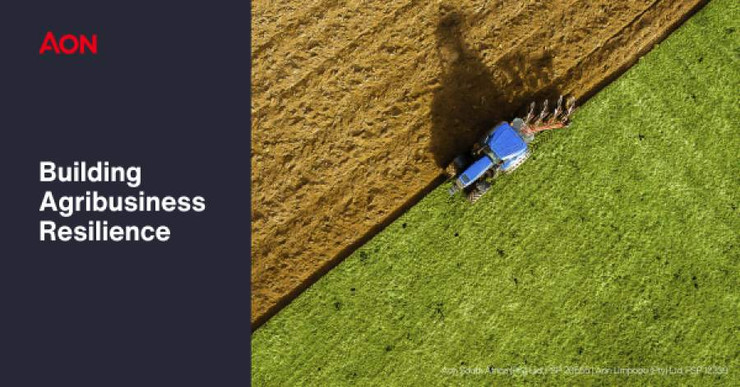Aon South Africa Highlights Top Factors To Consider In Order To Build A Resilient Agribusiness

Aon South Africa Highlights Top Factors To Consider In Order To Build A Resilient Agribusiness. Agri-businesses are facing many challenges, from rocketing commodity prices to digitalisation and climate change to shifting geopolitics and consumer behaviour. These risks are complex and interconnected, with the disruptive effects of climate change and extreme weather events contributing to significant losses in key regions. Aon South Africa, a leading global professional services firm took time to highlight the top factors entrepreneurs should consider when building a resilient Agribusiness.
Business Interruption:
Business interruption was ranked as the third most pressing concern to the agricultural sector in Aon’s latest Risk Management Survey. Cover for business interruption compensates farmers for financial losses resulting from physical damage to property or external events relating to supply chain or distribution failure. Food is global, and even the smallest food processor uses ingredients, packaging and equipment from around the world. Political unrest, trade disputes, natural disasters, workforce shortages, delays at ports and harbours, digitalisation and climate change will continue to cause business and supply chain disruptions and need to be thoroughly considered from a coverage perspective.
Cyber Risk:
Companies in the food value chain are prime targets for hackers, particularly ransomware strikes and data-extortion threats. Food production, including planting and harvesting crops, raising livestock, processing, packaging and logistics, has become more technologically sophisticated. Farmers and producers use distributed networks, remote sensors and computing to increase automation and efficiency on their farms, monitor the health of crops and livestock and tell when their equipment needs maintenance. The system is increasingly connected and cloud-based, creating a large potential cyber-attack surface.
Crop, Livestock and Game:
Crop, game, and livestock are the lifeline of farming operations. Without adequate insurance, a farm risks losing its income until these essentials are replaced. Replanting after a disaster can be particularly challenging – for instance, it can take up to seven years for a macadamia orchard to yield a crop after a major fire necessitating total replanting. Negotiating this type of cover with insurers is crucial given its significant impact on farm sustainability and income over an extended recovery period
Property:
Many farms have undergone expansions and renovations over the years, often resulting in outdated insurance coverage. Conducting a thorough property and asset valuation is essential to ensure that insurance sums adequately cover replacement costs, site rehabilitation and architectural plans in the event of fire or weather-related disasters.
Theft of Property and Commodities:
Theft remains an omnipresent risk that the farming community needs to contend with, which affects their property, contents and fleet covers. It is essential to work through the ramifications of the risk and how to manage the risk and/or transfer the risk where needed.




